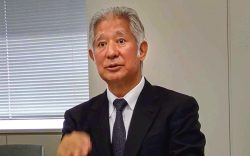- Yomiuri Editorial
- Next BOJ Governor
Ueda Must Flexibly Manage Policies in Line with Changing Circumstances
12:30 JST, February 11, 2023
How will Kazuo Ueda take over and revise the Bank of Japan’s nearly 10 years of massive monetary easing? The new governor of the central bank needs to comprehensively review past monetary policy and try to manage contemporary policy flexibly with a new perspective.
The government has decided to appoint Ueda, an economist and former central bank Policy Board member, to succeed Gov. Haruhiko Kuroda. Shinichi Uchida, a BOJ executive director, and Ryozo Himino, a former commissioner of the Financial Services Agency, will be appointed as deputy governors. They are expected to assume the posts after the House of Representatives and the House of Councillors approve their appointments.
Having been a professor at the University of Tokyo, Ueda served as a member of the central bank’s Policy Board from 1998 to 2005.
Under then Gov. Masaru Hayami, Ueda was involved in the formulation of the zero interest rate policy and other monetary easing measures that were exceptional at the time. He must use his insights as an academic and the knowledge he gained during his time as a member of the central bank’s Policy Board to make appropriate policy decisions.
Kuroda took office in March 2013 at the behest of then Prime Minister Shinzo Abe, who was seeking to end deflation. With a pledge to achieve a 2% inflation target in about two years, Kuroda introduced unprecedented monetary easing, involving large-scale purchases of government bonds.
As a result, the appreciation of the yen was corrected and corporate performance improved, especially among exporters, leading to higher stock prices and a lower unemployment rate. It is commendable that the policy brought a certain degree of stability to the Japanese economy.
However, the prolonged period of monetary easing has also brought about significant side effects.
Ultralow interest rates have worsened the earnings of financial institutions, and the central bank’s holdings of government bonds exceeded 50% in 2022 as a result of its continued massive purchases of the bonds to keep long-term interest rates low.
Holding interest rates down has increased market distortions. Some observers stress that the current monetary easing has reached its limits.
In addition, prices have been rising domestically as a result of the global surge in energy and food prices.
While the central banks in Europe and the United States are raising interest rates, the Bank of Japan has maintained its stance of continuing monetary easing on the grounds that price increases in this country have not been accompanied by wage hikes. However, if wage hikes do spread as a result of the spring labor-management negotiations and the upward trend in prices takes root, the Japanese central bank may be forced to change its policy.
The steering of the central bank can be said to be going through an extremely difficult phase. The new BOJ governor bears a great deal of responsibility.
Another issue is whether or not to review the joint statement that the government and the BOJ compiled in 2013. The statement calls for the central bank to achieve the 2% inflation target “at the earliest possible time.” Some have argued that the target should be a medium- to long-term goal and that policy should be made more flexible.
It is also important for the new governor to carefully coordinate with the government on how policy should be managed in the future.
(From The Yomiuri Shimbun, Feb. 11, 2023)
Top Articles in Editorial & Columns
-

40 Million Foreign Visitors to Japan: Urgent Measures Should Be Implemented to Tackle Overtourism
-

AI, Initially a Tool, is Evolving into a Partner – But is it a Good One?
-

University of Tokyo Professor Arrested: Serious Lack of Ethical Sense, Failure of Institutional Governance
-

Policy Measures on Foreign Nationals: How Should Stricter Regulations and Coexistence Be Balanced?
-

Greenland: U.S. Territorial Ambitions Are Anachronistic
JN ACCESS RANKING
-

Japan Institute to Use Domestic Commercial Optical Lattice Clock to Set Japan Standard Time
-

Israeli Ambassador to Japan Speaks about Japan’s Role in the Reconstruction of Gaza
-

Man Infected with Measles May Have Come in Contact with Many People in Tokyo, Went to Store, Restaurant Around When Symptoms Emerged
-

China Eyes Rare Earth Foothold in Malaysia to Maintain Dominance, Counter Japan, U.S.
-

Australian Woman Dies After Mishap on Ski Lift in Nagano Prefecture




















